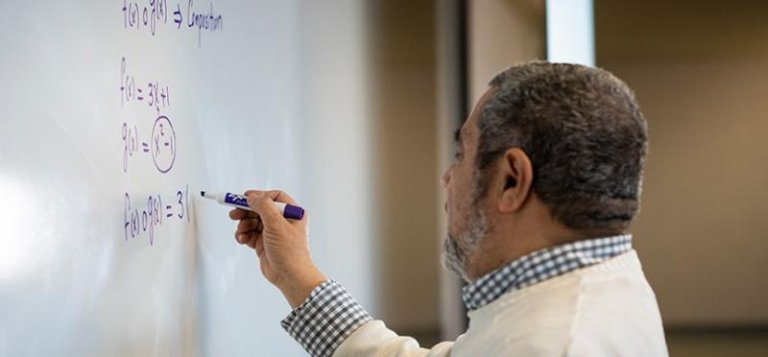Math Pathway Selection Guide
TCC offers math courses for various majors with corequisites for extra support. Consult your advisor to choose the right course for your degree.

Which math course is right for you?
TCC offers a variety of math courses geared toward different majors and degrees. While College Algebra (now called Precalculus I) used to be the standard college math course to take, other options are available that may be more relevant to your degree.
As always, please be sure to contact your advisor and your transfer institution before enrolling to confirm the best math class for your degree and transfer plans. Please note that Workforce degrees and certificates are not included in the list below.
What is a corequisite?
Corequisite courses are designed for students who need a little extra help in their college-level courses. Instead of having a prerequisite course that you must take before taking the college-level course, you will take both courses in the same semester. This helps you progress more quickly in your degree and has helped students be more successful.
Corequisite courses are not “study hall,” but are full classes involving homework, quizzes, and time with your professor to help you gain a better understanding of mathematics.
Math Pathways
MATH 1473 is a great course if you are not a STEM (Science, Technology, Engineering, and Math) major and need a math credit, or if you just want to learn more about how to use math in the real world. You will learn things like how to calculate your taxes, how car loans and mortgages work, measurements, unit conversion, probability, logic, and more!
The corequisite for this course is MATH 0472.
Course Description: Covers the skills and tools (including technology) needed to think critically about quantitative information encountered in daily life. Emphasis 00.on solving real-world problems utilizing open-ended exercises that involve reading, analyzing, calculating, and clearly reporting results. Topics include using numbers in the real world; financial literacy; statistics; probability; linear and exponential modeling.
Prerequisites: Appropriate placement or corequisite enrollment in MATH 0472.
If you are a business major, then MATH 1483 may be for you! This course is geared toward students seeking a business degree and covers topics like linear functions, inverse functions, loan repayment, inequalities, and plenty more. You will learn topics that will help you in your career as well as your day-to-day life.
The corequisite for this course is MATH 0482.
Course Description: Focuses on the analysis of functions and their graphs from the viewpoint of rates of change. Linear, polynomial exponential, logarithmic, and other function models will be studied, with applications to the natural sciences, business, social sciences, and agriculture.
Prerequisites: MATH 0482 or MATH 0513 with a grade of “C” or better, or appropriate placement, or corequisite enrollment in MATH 0482
Formerly known as College Algebra, MATH 1513 is the traditional starting point for STEM (Science, Technology, Engineering, and Math) majors. This gives you a solid foundation to help you succeed in future courses like Chemistry, Physics, and Calculus. You will learn about quadratic equations, logic, functions, and more.
The corequisite for this course is MATH 0513.
Course Description: Covers relations and functions; graphing using transformations; algebra of functions, circles and parabolas; polynomial and rational functions; study of equations and functions (polynomial, rational, radical, exponential, logarithmic), systems of equations. Suitable for students planning to take Calculus.
Prerequisites: MATH 0513 with a grade of “C” or better, appropriate placement, or co-requisite enrollment in MATH 0513.
If you’re interested in better understanding data and research or conducting your own, Elementary Statistics is a great starting point. You’ll learn some basic terms, how to measure and review your data, probability, and more.
There is currently no corequisite for this course.
Course Description: An introduction to basic statistical terminology, organization of data, measures of central tendency and dispersion, review of combinations, permutations, and probability, binomial and normal distributions, hypothesis testing, and a variety of other statistical techniques.
Prerequisite: MATH 0013 or MATH 0055 with a grade of “C” or better, or appropriate placement.
| Types of degrees that may require Quantitative Reasoning (MATH 1473) | Types of degrees that may require Functions and Modeling (MATH 1483) | Types of degrees that may require Precalculus I (MATH 1513) | Types of degrees that may require Statistics (MATH 2193) |
|---|---|---|---|
|
These degree pathways start with Calculus I (MATH 2114), however, MATH 1513 or other prerequisite courses for MATH 2114 may be your starting point:
|
1 A variety of math courses may work for this degree. Please check with your advisor and your transfer institution before enrolling to verify the best class for you.
2 Either MATH 1473 or MATH 1513 is required for this degree.
